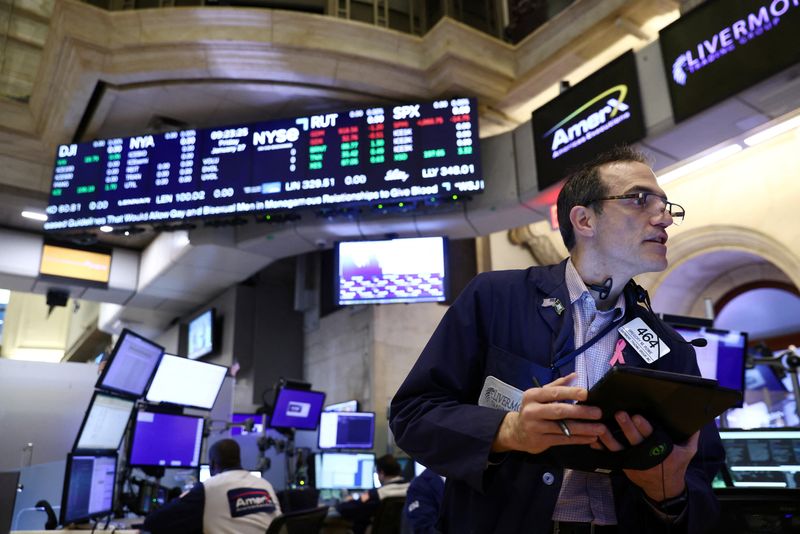By Lewis Krauskopf
NEW YORK (Reuters) - U.S. stocks that took a beating last year are surging in the early weeks of 2023, leading markets higher. Some investors believe that trend is unlikely to last.
Stunning gains in shares of companies such as Nvidia (NASDAQ:NVDA), Netflix (NASDAQ:NFLX) and Meta Platforms are lifting sectors that struggled in last year’s selloff, including technology, and communication services.
Smaller stocks that tumbled in 2022 have also burst out of the gate: a Goldman Sachs (NYSE:GS) basket of unprofitable tech stocks that tumbled over 60% in 2022 has rebounded 21% in 2023, dwarfing the S&P 500’s 6.5% gain.
A range of factors are driving the moves, including the attractiveness of beaten-up shares, a tailwind from falling bond yields and market participants unwinding bearish bets against stocks.
Some investors, however, are skeptical that the gains will last, especially if markets continue recalibrating expectations for how high the Federal Reserve will need to raise rates this year to keep cooling off inflation.
While it’s not unusual to see a reversal of trends to begin a year, "the extent to which it’s occurred is pretty dramatic,” said Walter Todd, chief investment officer at Greenwood Capital. “It certainly can’t continue at the extremes it has been.”
Greenwood Capital recently sold at least a portion of its shares in some 2023 winners, including Meta Platforms and Netflix. Meta is up 45% so far this year, while Netflix is up almost 18%. Those stocks fell 64% and 51% last year, respectively.
The S&P 500 jumped 6.2% in January as many investors rushed to raise their equity positioning after whittling it down last year, encouraged by several months of easing inflation readings. One measure, equity positioning for systematic investors, has climbed to its highest in a year, according to a report from Deutsche Bank (ETR:DBKGn) issued Feb 3.
Moderating bond yields, which surged in 2022 as the Fed raised interest rates to fight soaring inflation, bolstered the case for scooping up last year's losers. The yield on the benchmark 10-year U.S. Treasury note fell about 40 basis points during the first few weeks of the year to 3.4% at the start of February after reaching 15-year highs last year.
While falling yields often increase the allure of equities in general, they are particularly beneficial for the technology and growth stocks whose valuations suffered when yields shot higher in 2022.
“When interest rates fall, lower quality, longer duration assets do well," said Rob Almeida, global investment strategist at MFS Investment Management.
Yields have headed higher again in recent days, however, as investors raised estimates for how high the Fed will lift rates and how long the central bank will keep them at peak levels. That's weighed on stocks in the latest week, which saw the S&P 500 lose 1.1% after two straight weeks of gains.
"The market leaders to-date ... are vulnerable to the higher-for-longer interest rates and a slowing economy," strategists at the Wells Fargo (NYSE:WFC) Investment Institute said in a note Thursday. "We do not view the recent breadth and leadership as sustainable -- yet -- and prefer not to chase equity rallies at this time."
Investors will be closely watching Tuesday's release of U.S. consumer price data for signs that inflation is continuing to moderate.
David Kotok, chief investment officer at Cumberland Advisors, is skeptical of the latest rally and some of the stocks leading the current run. His firm is underweight many of the big tech and growth stocks that have rebounded in 2023, preferring healthcare and defense shares and keeping a big allocation in cash.
“Either the deterioration last year from an overvalued space is over, or this is a dead cat bounce in a wounded large sector and the bear market of last year is not over," Kotok said. "I am in the latter camp.”
To be sure, there are some signs the leaders could continue to do well.
Since 1990, the three best-performing sectors in January went on to post an average return of 11.3% over the next 12 months versus the S&P 500’s average gain of 9.3% over that time, according to investment research firm CFRA Research.
Matt Stucky, senior portfolio manager at Northwestern (NASDAQ:NWE) Mutual Wealth Management Company, said some of last year’s most beaten-up stocks could continue moving higher in the near term as investors cover more short positions.

Short sellers have covered $51 billion of their bearish bets so far in 2023, or about 6% of total shares shorted, including over $1 billion in shorts each related to Amazon (NASDAQ:AMZN) and Alphabet (NASDAQ:GOOGL) shares, according to financial and analytics firm S3 Partners.
“Can this last a quarter or two? Yes," Stucky said. "Can it last for the entirety of 2023 or a multiyear period? Likely not."